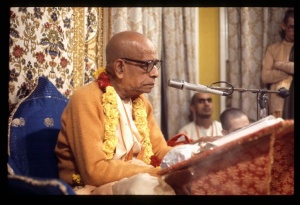SB 12.1.32-33: Difference between revisions
m (1 revision(s)) |
(Vanibot #0054 edit - transform synonyms into clickable links, which search similar occurrences) |
||
| (One intermediate revision by one other user not shown) | |||
| Line 1: | Line 1: | ||
{{info | {{info | ||
|speaker= | |speaker=Śukadeva Gosvāmī | ||
|listener=King | |listener=King Parīkṣit | ||
}} | }} | ||
[[Category:Srimad-Bhagavatam - Canto 12 Chapter 01]] | |||
[[Category:Bhagavatam Verses Spoken by Sukadeva Gosvami - Vanisource|120133]] | |||
<div style="float:left">'''[[Srimad-Bhagavatam]] - [[SB 12|Twelfth Canto]] - [[SB 12.1: The Degraded Dynasties of Kali-yuga|Chapter 1: The Degraded Dynasties of Kali-yuga]]'''</div> | |||
<div style="float:right">[[File:Go-previous.png|link=SB 12.1.29-31]] '''[[SB 12.1.29-31]] - [[SB 12.1.34]]''' [[File:Go-next.png|link=SB 12.1.34]]</div> | |||
{{RandomImage}} | |||
{{SBnotice}} | |||
==== TEXTS 32-33 ==== | ==== TEXTS 32-33 ==== | ||
<div | <div class="verse"> | ||
teṣāṁ trayodaśa sutā | :teṣāṁ trayodaśa sutā | ||
bhavitāraś ca bāhlikāḥ | :bhavitāraś ca bāhlikāḥ | ||
puṣpamitro 'tha rājanyo | :puṣpamitro 'tha rājanyo | ||
durmitro 'sya tathaiva ca | :durmitro 'sya tathaiva ca | ||
eka-kālā ime bhū-pāḥ | |||
saptāndhrāḥ sapta kauśalāḥ | :eka-kālā ime bhū-pāḥ | ||
vidūra-patayo bhāvyā | :saptāndhrāḥ sapta kauśalāḥ | ||
niṣadhās tata eva hi | :vidūra-patayo bhāvyā | ||
:niṣadhās tata eva hi | |||
</div> | </div> | ||
| Line 21: | Line 27: | ||
==== SYNONYMS ==== | ==== SYNONYMS ==== | ||
<div | <div class="synonyms"> | ||
''[//vanipedia.org/wiki/Special:VaniSearch?s=teṣām&tab=syno_o&ds=1 teṣām]'' — of them (Bhūtananda and the other kings of the Kilakilā dynasty); ''[//vanipedia.org/wiki/Special:VaniSearch?s=trayodaśa&tab=syno_o&ds=1 trayodaśa]'' — thirteen; ''[//vanipedia.org/wiki/Special:VaniSearch?s=sutāḥ&tab=syno_o&ds=1 sutāḥ]'' — sons; ''[//vanipedia.org/wiki/Special:VaniSearch?s=bhavitāraḥ&tab=syno_o&ds=1 bhavitāraḥ]'' — will be; ''[//vanipedia.org/wiki/Special:VaniSearch?s=ca&tab=syno_o&ds=1 ca]'' — and; ''[//vanipedia.org/wiki/Special:VaniSearch?s=bāhlikāḥ&tab=syno_o&ds=1 bāhlikāḥ]'' — called the Bāhlikas; ''[//vanipedia.org/wiki/Special:VaniSearch?s=puṣpamitraḥ&tab=syno_o&ds=1 puṣpamitraḥ]'' — Puṣpamitra; ''[//vanipedia.org/wiki/Special:VaniSearch?s=atha&tab=syno_o&ds=1 atha]'' — then; ''[//vanipedia.org/wiki/Special:VaniSearch?s=rājanyaḥ&tab=syno_o&ds=1 rājanyaḥ]'' — the king; ''[//vanipedia.org/wiki/Special:VaniSearch?s=durmitraḥ&tab=syno_o&ds=1 durmitraḥ]'' — Durmitra; ''[//vanipedia.org/wiki/Special:VaniSearch?s=asya&tab=syno_o&ds=1 asya]'' — his (son); ''[//vanipedia.org/wiki/Special:VaniSearch?s=tathā&tab=syno_o&ds=1 tathā]'' — also; ''[//vanipedia.org/wiki/Special:VaniSearch?s=eva&tab=syno_o&ds=1 eva]'' — indeed; ''[//vanipedia.org/wiki/Special:VaniSearch?s=ca&tab=syno_o&ds=1 ca]'' — and; ''[//vanipedia.org/wiki/Special:VaniSearch?s=eka&tab=syno_o&ds=1 eka]-[//vanipedia.org/wiki/Special:VaniSearch?s=kālāḥ&tab=syno_o&ds=1 kālāḥ]'' — ruling at the same time; ''[//vanipedia.org/wiki/Special:VaniSearch?s=ime&tab=syno_o&ds=1 ime]'' — these; ''[//vanipedia.org/wiki/Special:VaniSearch?s=bhū&tab=syno_o&ds=1 bhū]-[//vanipedia.org/wiki/Special:VaniSearch?s=pāḥ&tab=syno_o&ds=1 pāḥ]'' — kings; ''[//vanipedia.org/wiki/Special:VaniSearch?s=sapta&tab=syno_o&ds=1 sapta]'' — seven; ''[//vanipedia.org/wiki/Special:VaniSearch?s=andhrāḥ&tab=syno_o&ds=1 andhrāḥ]'' — Andhras; ''[//vanipedia.org/wiki/Special:VaniSearch?s=sapta&tab=syno_o&ds=1 sapta]'' — seven; ''[//vanipedia.org/wiki/Special:VaniSearch?s=kauśalāḥ&tab=syno_o&ds=1 kauśalāḥ]'' — kings of Kauśala-deśa; ''[//vanipedia.org/wiki/Special:VaniSearch?s=vidūra&tab=syno_o&ds=1 vidūra]-[//vanipedia.org/wiki/Special:VaniSearch?s=patayaḥ&tab=syno_o&ds=1 patayaḥ]'' — rulers of Vidūra; ''[//vanipedia.org/wiki/Special:VaniSearch?s=bhāvyāḥ&tab=syno_o&ds=1 bhāvyāḥ]'' — will be; ''[//vanipedia.org/wiki/Special:VaniSearch?s=niṣadhāḥ&tab=syno_o&ds=1 niṣadhāḥ]'' — Niṣadhas; ''[//vanipedia.org/wiki/Special:VaniSearch?s=tataḥ&tab=syno_o&ds=1 tataḥ]'' — then (after the Bāhlikas); ''[//vanipedia.org/wiki/Special:VaniSearch?s=eva&tab=syno_o&ds=1 eva] [//vanipedia.org/wiki/Special:VaniSearch?s=hi&tab=syno_o&ds=1 hi]'' — indeed. | |||
</div> | </div> | ||
{{SBcollapse}} | |||
==== TRANSLATION ==== | ==== TRANSLATION ==== | ||
<div | <div class="translation"> | ||
The Kilakilās will be followed by their thirteen sons, the Bāhlikas, and after them King Puṣpamitra, his son Durmitra, seven Andhras, seven Kauśalas and also kings of the Vidūra and Niṣadha provinces will separately rule in different parts of the world. | The Kilakilās will be followed by their thirteen sons, the Bāhlikas, and after them King Puṣpamitra, his son Durmitra, seven Andhras, seven Kauśalas and also kings of the Vidūra and Niṣadha provinces will separately rule in different parts of the world. | ||
</div> | </div> | ||
__NOTOC__ | </div> | ||
</div> | |||
<div style="float:right">[[File:Go-previous.png|link=SB 12.1.29-31]] '''[[SB 12.1.29-31]] - [[SB 12.1.34]]''' [[File:Go-next.png|link=SB 12.1.34]]</div> | |||
__NOTOC__ | |||
__NOEDITSECTION__ | |||
Latest revision as of 20:56, 17 February 2024

A.C. Bhaktivedanta Swami Prabhupada
Please note: The synonyms, translation and purport of this verse were composed by disciples of Śrīla Prabhupāda
TEXTS 32-33
- teṣāṁ trayodaśa sutā
- bhavitāraś ca bāhlikāḥ
- puṣpamitro 'tha rājanyo
- durmitro 'sya tathaiva ca
- eka-kālā ime bhū-pāḥ
- saptāndhrāḥ sapta kauśalāḥ
- vidūra-patayo bhāvyā
- niṣadhās tata eva hi
SYNONYMS
teṣām — of them (Bhūtananda and the other kings of the Kilakilā dynasty); trayodaśa — thirteen; sutāḥ — sons; bhavitāraḥ — will be; ca — and; bāhlikāḥ — called the Bāhlikas; puṣpamitraḥ — Puṣpamitra; atha — then; rājanyaḥ — the king; durmitraḥ — Durmitra; asya — his (son); tathā — also; eva — indeed; ca — and; eka-kālāḥ — ruling at the same time; ime — these; bhū-pāḥ — kings; sapta — seven; andhrāḥ — Andhras; sapta — seven; kauśalāḥ — kings of Kauśala-deśa; vidūra-patayaḥ — rulers of Vidūra; bhāvyāḥ — will be; niṣadhāḥ — Niṣadhas; tataḥ — then (after the Bāhlikas); eva hi — indeed.
Translation and purport composed by disciples of Śrīla Prabhupāda
TRANSLATION
The Kilakilās will be followed by their thirteen sons, the Bāhlikas, and after them King Puṣpamitra, his son Durmitra, seven Andhras, seven Kauśalas and also kings of the Vidūra and Niṣadha provinces will separately rule in different parts of the world.